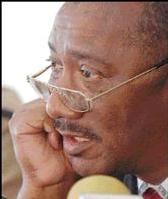
FORBES
Howard Campbell, Gleaner Writer
DESPITE A record number of homicides in 2004, the loss of some of his men and intense criticism from some public quarters, retiring Commissioner of Police Francis Forbes insists the Jamaica Constabulary Force (JCF) still has a lot of positives to report.
Pointing to the crime statistics last year, the commissioner said the men and women under his command were able to remove 620 illegal guns from the streets.
In fact, apart from the commissioner's pleasure at the launch of the Corporate Strategy document, the force under his watch succeeded on most critical occasions to impress the wider society.
Two such occasions were the General Election of 2002 and during the onslaught of Hurricane Ivan, last year. The impeccable performance of the police during the election is well documented as many hailed the lawmen for being objective and even-handed as thousands voted islandwide in what is believed to be the island's cleanest and fairest election in history.
Some of Jamaica's prominent civic and legal personalities gave high marks to Commissioner Forbes and his team for a 'creditable' performance during Hurricane Ivan's walloping.
Executive director of Jamaicans for Justice (JFJ), Dr. Carolyn Gomes was among those saluting the JCF.
"We are upset over the injury of the four policemen, but given the circumstances under which they were asked to work, we believed they performed creditably," said Dr. Gomes.
Winston Dear, chairman of the Montego Bay Chamber of Commerce, commended the lawmen for 'a job well done.' Mr. Dear said the police were able to apprehend two looters who were caught breaking into a building.
Commissioner Forbes must also take a bow for the introduction of the police truancy programme, which saw several lawmen being placed on school compounds. The police truancy programme was conceived following several violent incidents in schools which resulted in the destruction of school property, stabbings, and even deaths.
However, for much of his eight years as police commissioner, Francis Forbes squared off with local human rights groups.
A spokesperson for one of those organisations says although he made several attempts to improve the force's image, Mr. Forbes fell short when it came to implementing policies.
Susan Goffe, a director of Jamaicans For Justice (JFJ), said the Bureau of Special Investigations (BSI) and community policing were two of Mr. Forbes' more solid proposals. But she said because both were poorly managed, they have not been as effective as they should be. According to Ms. Goffe, this summed up Mr. Forbes' tenure.
INITIATIVES
"There was a failure to bring things from paper onto the ground. In other words, there were a number of initiatives that sounded good on presentation, but implementation was weak. The BSI was under-staffed and under-manned and its effectiveness was undermined by this," she said. As for community policing, one of Mr. Forbes' pet projects, Ms. Goffe questioned its success. She used the indifferent relationship citizens especially in inner-city areas have with members of the Jamaica Constabulary Force to prove her point.
"This (community policing) is another instance of a good initiative but again how far has this gone in terms of implementation? How much emphasis has really been put on the ground in bringing those principles into being where the community has a say in how they are policed?" she asked.
The police have been consistently criticised by JFJ, an aggressive organisation that sprang up during the March 1999 gas riots. Failure to regulate the use of force, questionable police shootings, inadequate protection of crime scenes and the "disappearance" of policemen on trial are some of the issues about which they have knocked heads with the Police High Command. Ms. Goffe says despite several meetings with Mr. Forbes, little was done to address their concerns.
"We are dissatisfied at the impact they (meetings) had. There was a lack of commitment to take these matters seriously," she said. JFJ, its local counterpart Families Against State Terrorism, Amnesty International and Scotland Yard have condemned the police's monitoring of crime scenes in two high-profile incidents involving the controversial Crime Management Unit. The first took place at Braeton, St. Catherine, in March 2001 and the other at Kraal, Clarendon, in May 2003.
Seven youth were killed at Braeton and four persons, including two women, were killed at Kraal.










